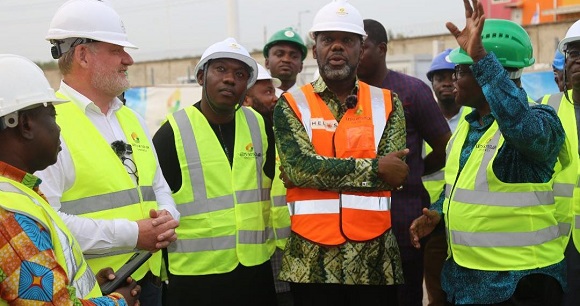The Minister for Energy, Dr Mathew Opoku Prempeh, on Monday inspected works on Africa’s largest Solar Rooftop Project by Helios Solar Company at the Tema Free zones enclave.
When completed, the solar energy project will supply 16.82 megawatts of energy to Helios and its partners.
Helios, an indigenous Ghanaian company and part of LMI Holdings Group, has pledged to facilitate Ghana’s industrialisation agenda.
Interacting with the Chief Executive Officer of LMI Group Holdings, Kojo Aduhene, Dr Prempeh said the achievement by Helios Solar represented a significant milestone for the company and underpins the company’s commitment to facilitating Ghana’s industrialisation agenda.
The project, fully funded by the International Finance Corporation (IFC), is part of a $30 million clean power and water deal with LMI Holdings to support job creation and greener, more sustainable and more competitive industrial development in the country.
The partnership with IFC gives LMI the means and space to make big bets in Ghana and beyond. Through this investment, the project will demonstrate how the private sector can bring effective solutions to development challenges.
Kyle Kelhofer, IFC’s Senior Country Manager for Ghana, stated that, “This project demonstrates how the private sector can bring effective solutions to development challenges and support job creation.”
The solar plant, compared with current thermal power on the national grid, is expected to reduce Ghana’s emissions by approximately 13,000 tons of CO2 equivalent annually.
The PV Solar project involves the installation of 29,252 solar panels of the latest N-type technology across a rooftop area of 95,000m2 of the International Warehousing Company Mega-warehouse located in the Tema Freezone. A total of 128 Ghanaian nationals are directly employed in the implementation of the solar project.
Once completed, it is projected that the solar system will annually produce 24,750 megawatts per hour (MWH) of clean, stable and sustainable electricity, and this quantum of power generated is equivalent to the annual consumption of 55,000 homes.





